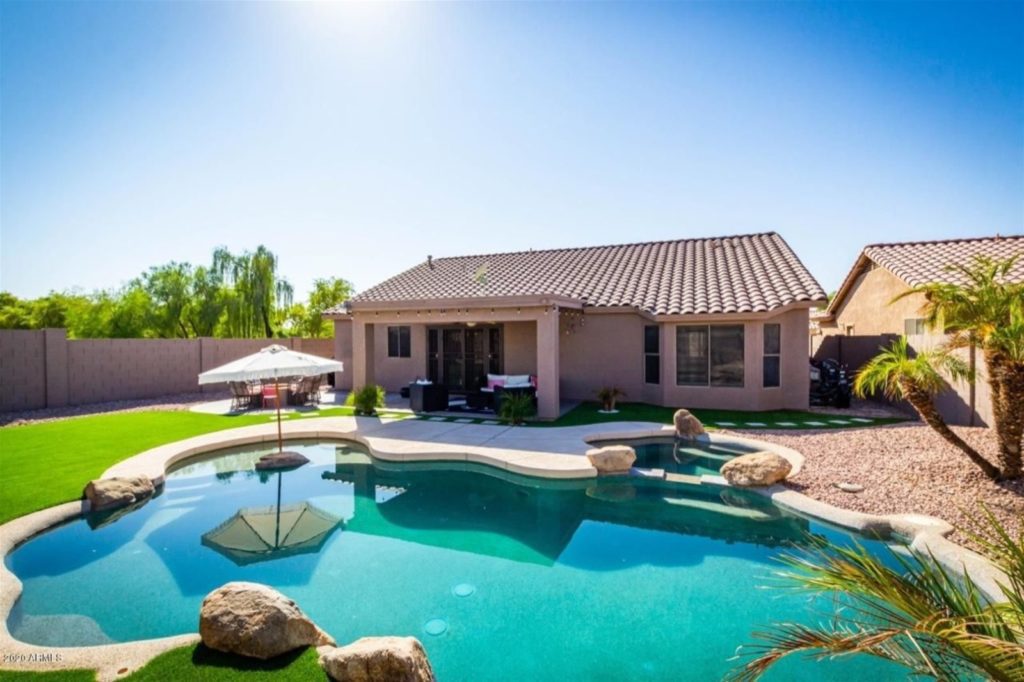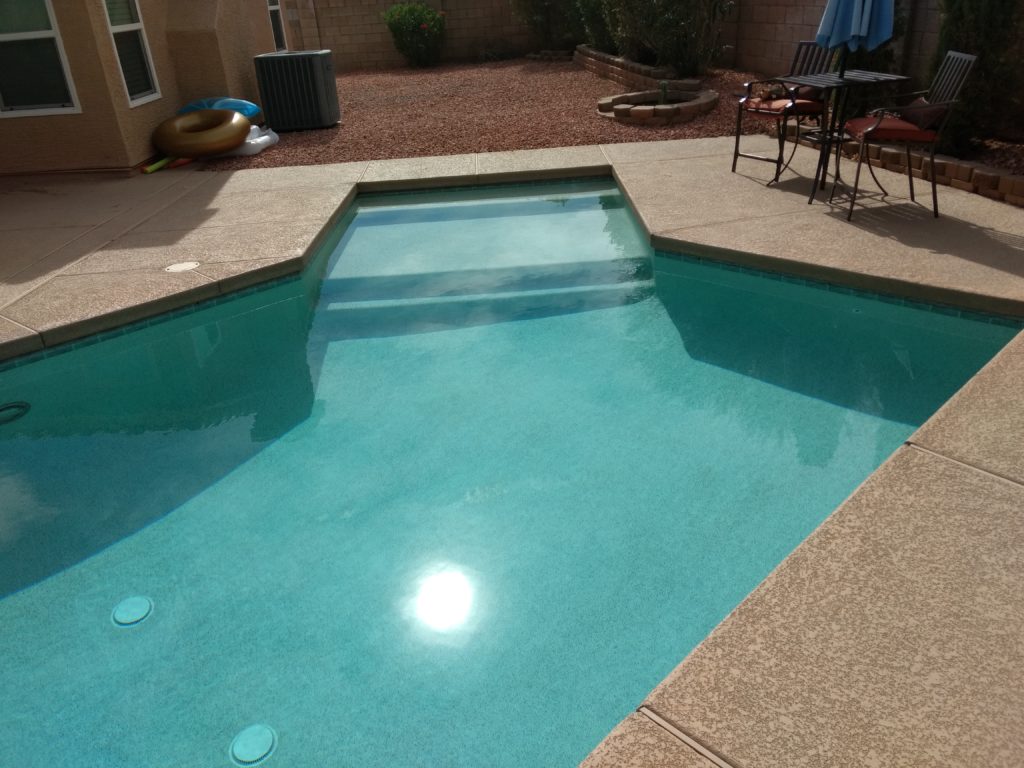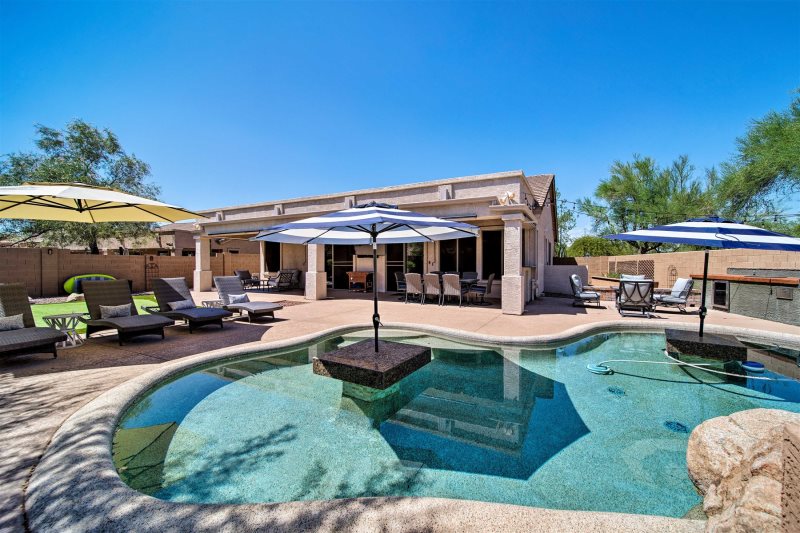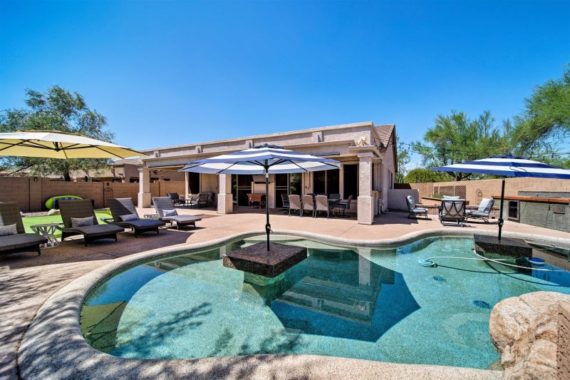Pool Maintenance and Heaters in Phoenix Winters
Now that we’ve hit mid-Autumn in Arizona, the scorching heat has, at last, begun to subside. Temperatures are dropping in the evenings now, and it finally feels like fall!
A change in season means changes in your vacation rental as well, and today we’re focusing on pools! Just because the weather is cooling off doesn’t mean the pool goes dormant and forgotten during the winter.
So what should you do with your pool in the cooler weather?

Pool Maintenance
Your pool may see a sharp decrease in use, but that doesn’t mean you can let it sit. Operate your pool filter 3-4 hours per day to keep particles and junk out of the water, and set up a weekly maintenance routine that includes the following:
- Cover your pool! This helps keep the water surface from icing over and keeps most debris out of the water. Inspect the cover weekly to make sure it’s secure and can’t blow away in windy weather. Check the water under the cover and remove any stray debris as needed.
- Check the water balance. Allowing the water to become unbalanced causes mineral and calcium buildup that will damage your pool equipment in the long run. It also invites algae and bacteria to grow and will be more difficult to remove when you’re ready to use the pool again.
- Use an algicide to prevent algae growth.
- Check the pool filter and clean as needed. Continue to backwash the pool to prevent dirt and algae buildup.
- Check the plumbing, along with any exposed equipment, and make sure it isn’t damaged.
- Check cleaner bags, pump baskets, and floater containers. Remove debris as needed.
- Continue to skim, vacuum, and brush your pool.
- Keep an eye on your freeze guard. While it isn’t common, Phoenix occasionally plummets below 32 degrees. Water expands when frozen and this can damage and/or break your equipment. If you have any exposed pipes or equipment, make sure they’re properly insulated against colder temperatures.
- If you’re not using the pool, you can the amount of sanitizer you use at this time(but don’t stop adding it!).
- Have your pool inspected at the end of the summer season and again when the temperatures warm back up to ensure that your pool working correctly and is safe for guests to use.
Heating Your Pool
Having a pool heater installed gives you a competitive edge on the vacation rental market! A heater means your pool can be used all season, and is a great amenity to have on your property to enhance guest experience.

Cost
Depending on the size of the pool and type of heater, you’re looking at paying a total of anywhere from $1500 to $4500 to have one installed. Energy and maintenance costs, on average $170-$200 per month, or $800 to $1000 per season. Keep this in mind when determining your rental rates for the winter.
Heater Types
- Solar. Solar is a tempting option for a pool heater. It utilizes the sun instead of gas or electricity to heat the pool, which can lower your utility bills. It’s the cheapest and cleanest energy source. But solar heaters are slow, and only heat the water one to three degrees per day, not ideal for a vacation rental. They’re also expensive: expect to pay a minimum of $5500 for an installed solar heating system.
- Heat Pumps. There are two types of heat pumps: gas and electric-powered.
- Gas Pumps: The average cost of a gas heater is anywhere from $1500 to $2500, with an additional $500 to $1500 of installation costs. Operation costs run $200-$400 per month. If your home is not powered by natural gas you will need a propane tank, a pump, and a line installed, which adds to overall costs. Damaged heat exchangers and burner trays down the line can add to the maintenance costs, and they have a life expectancy of 8 to 12 years. Gas pumps operate at roughly 80% efficiency and heat the pool quickly, one to three degrees per hour, and do not need to stay on all the time, so if you’re charging separately for a heated pool, this might be the better option for you.
- Electric Pumps: Electric pumps require a 220v dedicated line and a minimum 40-amp breaker(60-amp is preferred). Electric heat pumps costs between $2500 and $3500, plus an additional $1000 on average in installation fees. While the initial cost is more expensive than a gas heater, they have a life expectancy of 12-15 years and electric pumps tend to have fewer repair needs than a gas pump, making them more reliable. They average $100-$200 per month in operating costs. While the operating costs are lower than a gas pump, electric heaters need to stay on continuously. Keep this in mind if when figuring out pricing and availability for your guests.
- Pool Cover. Regardless of what type of heater you go with, you should still cover your pool when not in use. Using a pool cover can reduce heat loss and water evaporation by up to 75%.
Whether you choose to heat your pool in the winter or keep it covered, of course, is up to you. Either way, making sure you stay on top of pool maintenance will make transitioning back to summer use a breeze!


